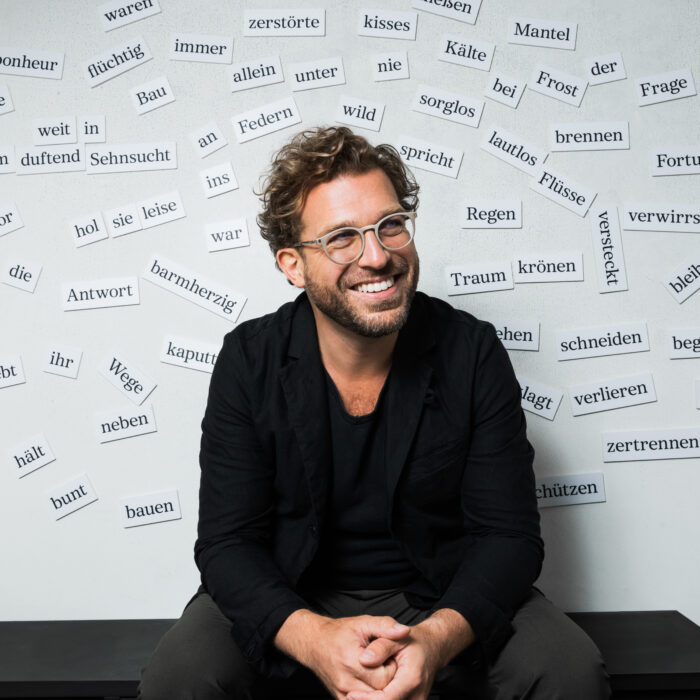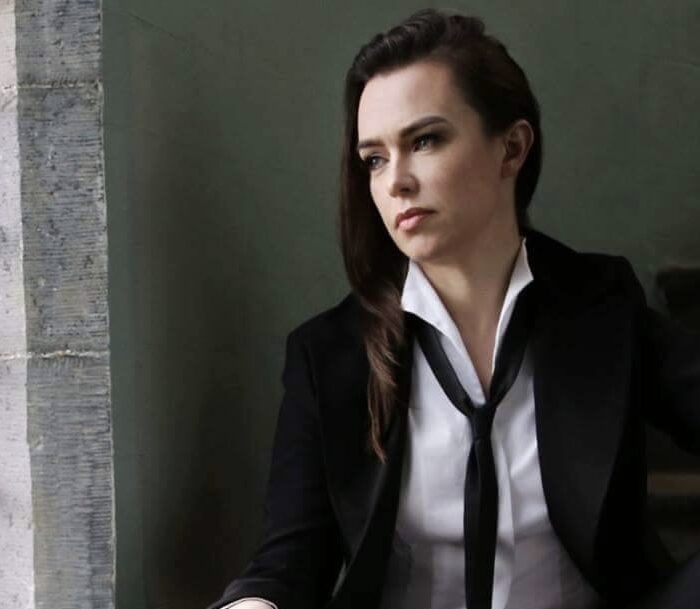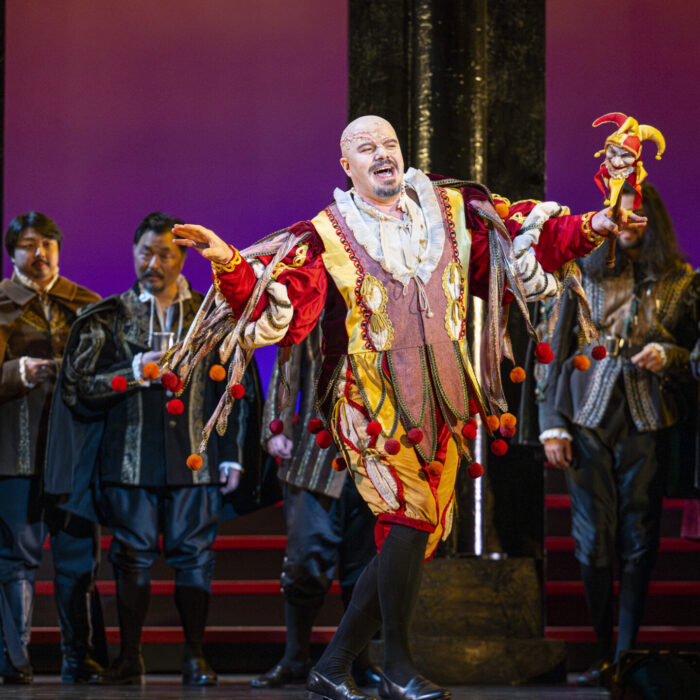
Rising to the Top: Chanáe Curtis & Darren Drone on Performing ‘Falstaff’ at Opera San Jose
By Lois SilversteinTo talk with the rising stars of Opera San Jose’s upcoming production of “Falstaff” was more than a treat: it was a privilege.
The perspectives of soprano Chanáe Curtis and baritone Darren Drone promise rich and vibrant contributions to their future musical careers. Each of the young singers showed a genuine commitment to opera and their contributions to it. In “Falstaff,” Curtis will appear as Alice Ford and Drone as Falstaff. It is evident from both their appearances in previous operas they will each bring substantial dramatic panache and vital energy to Verdi’s comic and final opera.
The opera, adapted by Arrigo Boito from Shakespeare’s play, “The Merry Wives of Windsor,” is a much-beloved work and a comedy that some say “gets funnier the older you get.” Further, “Falstaff is about the illusions we all have about ourselves and the fools they can make of us,” and “Sir John Falstaff, a rakish old knight, thinks he hasn’t lost a step in his ability to woo women whether married, younger or both! The pranks the wives play on Falstaff and the lessons they teach him and their gullible husbands form the centerpiece of this riotous and human comedy.”
I talked with both Curtis and Drone during their final preparation for the upcoming series of performances. We discussed their current preparation and rehearsal process, some aspects of their earlier vocal and acting training, and most recent roles in the U.S. and abroad, and how excited they are to undertake the challenges of this splendid opera.
Chanáe Curtis
Curtis was captured by Whitney Houston, who sang in a way that not only made her cry but enabled her to feel the music in “my own soul.” The Ohio native began making music by playing the flute, and although she listened to an older sister sing, she had no plans to follow in her shoes.
It was not until she was caught humming and singing en route to an orchestra rehearsal did her voice move her forward. And it wasn’t until she dared to leave her shyness behind and step into the spotlight did she lay claim to her vocal and dramatic capacities.
The music department at Ashland University proffered her with technical expertise. Craig McGaughey, in particular, helped coach her even further from her stage fright into singing with presence and ease.
Curtis holds a Bachelor of Arts degree from Ashland University, a Master of Music from the Manhattan School of Music, and a Master of Arts in Opera, with distinction, from the Royal Welsh College of Music and Drama.
After listening intensively as a young singer to Leontyne Price and then Kathleen Battle and Barbara Hendrix, Curtis connected to the levels of depth that joined with feelings of joy and depth. This combination helped her to discover new possibilities and to relish a future in which she could sing for the audience without worrying about being perfect. In other words, she became ready to perform.
Curtis continued her training with the Metropolitan Opera, Scuola di Bel Canto, Royal Welsh College of Music and Drama, and Central City Opera. Roles she has already performed include Léontine in “L’amant Anonyme” (Wolf Trap Opera), Nedda in “Pagliacci”(Opera Memphis), and Annie in “Porgy and Bess”(The Metropolitan Opera).
The soprano has performed extensively abroad, including an appearance with Welsh National Opera as Anna Gomez in Menotti’s “The Consul,” a performance of Strauss’s “Four Last Songs” at St. David’s Hall, and a guest appearance at Buckingham Palace, performing for His Royal Highness, Prince Charles. Other notable roles for Curtis include Musetta in “La Bohème,” Alice Ford in “Falstaff,” Countess Almaviva in “Le Nozze di Figaro,” and Fiordiligi in “Così fan tutte.”
Preparation to sing this new role of Alice Ford continued when Curtis sang and covered the role of Countess Almaviva in Mozart’s “Le Nozze di Figaro” at Central City Opera. “It allowed me,” she noted, “to express not only my musical self but to cultivate the depths of a multilayered woman.” And, she added, “that’s what I want to convey when I perform, depth as well as range, roundedness as well as significant point. I knew when I came to San Jose that this role was going to be vocally taxing, but the challenge has excited me.”
Curtis noted she continues to learn how many things go into becoming a standout performer.
“Captivating an opera audience is a different stretch than singing in a conservatory, although that is wonderful in its own way. In both, however, colleagues count a lot; they help me develop a character, and developing a character helps me to grow as a person off stage, in life itself.”
That, too, is what she wants the audience to experience when she steps on stage.
“I have come through my training to see that my earlier shyness was me not being more of who I am. A large personality is someone who does not go along with the crowd. Rather, she or he is someone who works hard, who digs deep and aims to present all the many layers of the character she sings. I want that to be known as my contribution to operatic singing.
Further, this will help me make my operatic character relevant to real life. I am committed to my craft as an opera singer and actor. I want to keep developing a high and solid standard of singing so that when an audience comes to hear me, along with my colleagues, they already know that I will deliver the goods.”
As a perfectionist, she is often uncertain of when a role is “ready” for the audience. She goes all out on each detail and delves into the character of Alice Ford. Her work with colleagues has helped her meticulously study her role and see how it influences the whole opera.
When I asked Curtis how she would describe her voice, she spoke of chocolatey with bits of caramel. Also that she has been working on extending both her top and bottom range, and is developing her handling of Strauss Lieder, which she thinks is a good direction for her voice. She has already started learning German and loves Italian. “La Traviata” is the next challenge.
“Singing in the Met’s production of ‘Porgy and Bess’ in 2019 was a dream. Also, being part of a team of colleagues was a bonus. And more of a surprise.”
Darren Drone
Darren Drone, baritone, hails from Arkansas and has what he described as chocolately dark and warm “Some have even called it handsome, and that pleases me.”
Yet, singing wasn’t something he did when he was younger.
“I didn’t begin with singing in a church choir, as many do,” he said. “I left that to my sisters.”
It was “Guys and Dolls,” the Loesser/Lowe musical, that captivated him as a sophomore in High School.
“I just loved it and played the recording over and over and over. I surprised myself, as well as everybody else, when I auditioned for the show. Nobody knew me. Then, I was chosen for the lead. It was more than a thrill.”
In his early training with Dr. Jon Clements at Arkansas Tech, his first voice teacher, he received the seeds for his own artistic process of operatic character development.
“His (Clement’s) ‘chill’ approach, as he called it, gave me permission to play around with a role and my range. Clements encouraged me to try tenor and bass ranges and my native baritone as I was learning roles. That way, I could explore the range of the role and find my own edges.”
As he has progressed, Drone has been learning the languages opera singers need to perform.
“That is a challenge. What are the differences between singing and speech, and how to communicate effectively the characters’ feelings in their roles in this ‘other’ way? I find it fascinating to consider all the options for expressing myself in this way.”
Along his journey from Arkansas, he sang in “Opera in the Ozarks” and Glimmerglass in the summer. He also sang Marcello in an LA production of “La Bohème.”
When I asked what connections he saw between his personal self and his opera singer-performer self, Drone said he doesn’t separate who he is from who he plays and sings.
“That is natural, of course,” he said, but he stretches his imagination so that he can build a character that comes from himself but is bigger and fuller. He starts with a kind of blank slate and lets himself allow what happens in rehearsal, and his own personal character guides his creativity and, in that way, expands and finds its own range and depth. He has applied this with his Falstaff, which is a dream come true. As Sir John, he plays at once a cocky and lively guy, a buffoon, and a vulnerable human being. He says many can relate to that human being.
“Before us, we will see our human foibles and feel kin to the character.”
As a notorious night owl, Drone finds singing and performing a good fit for him, and he describes his voice as chocolately dark and warm.
“I’m alive and energetic when it is performance time. Of course, when the curtain is about to rise, I have the usual butterflies, but during the performance, I am 100% comfortable.”
Drone is an optimist and finds it wonderful to step on the boards and interact with his colleagues. When the curtain comes down, he is happy to join them for a bite to eat or to scoot off to his own place to relax and unwind. Living the life of a singer does not preclude his personal relationships. Drone is always eager to keep in close contact with his family and close friends.
Although the travel and the 24/7 dedication to the operatic life can sometimes become lonely, he always has a book in his hand. He loves to read. He’s a great Stephen King fan and loves horror movies. Also, he likes to read current social explorations like Jonathan Haight’s “The Righteous Mind.” It is clear from speaking with Drone that he is a lively, warm, and intelligent young man eager to inform his whole being and life to music and his part in it. No question that his debut as Falstaff will show him at his best, and the audiences at Opera San Jose will be enchanted.


